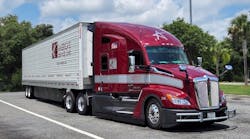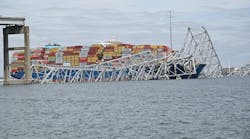The ongoing debate over allowing Mexican trucks to operate on U.S. roads is being ratcheted up a notch as businesses and unions butt heads over the issue’s long-term impact on trade and jobs.
The U.S. Chamber of Commerce has released a broad study claiming there’s a high economic cost to America – particularly in lost jobs – from the U.S. refusal to implement cross-border trucking with Mexico, along with not approving pending trade agreements and the imposition of "Buy American" rules in the $787 billion stimulus bill passed by Congress in February.
The study – entitled “Trade Action or Inaction: The Cost for American Workers and Companies” – found that the U.S. failure to implement cross-border trucking provisions of the North American Free Trade Agreement (NAFTA) with Mexico has resulted in $2.2 billion in higher costs for a variety of imported goods, $2.6 billion in lost U.S. exports, and more than 25,000 lost jobs for American workers.
“The U.S. has refused to keep its word to Mexico,” said Thomas Donohue, president & CEO of the U.S. Chamber, during a speech unveiling the study at the Michigan Chamber of Commerce yesterday. “How can we call on other countries to meet their obligations under trade agreements if we refuse to meet our own?”
The International Brotherhood of Teamsters (IBT), however, is bitterly contesting the study’s conclusion about the impact of forbidding Mexican carriers to operate on U.S. highways.
"The Chamber gets it exactly wrong on several levels," said IBT general president Jim Hoffa. “First, it's NAFTA that cost at least a million U.S. jobs. Second, Mexico imposed tariffs that are manifestly excessive, and that's a violation of trade rules. It's outrageous to blame the U.S. government for Mexico's disregard for U.S. highway safety standards as well as trade agreements.”
The trade dispute with Mexico began in March when President Obama signed a Congressional appropriations bill that shut down a pilot program that had opened the border to Mexican trucks. In response, Mexico imposed sanction revenues on $2.4 billion in U.S. trade. U.S. retaliatory tariffs are estimated to be $427 million and the Teamsters said it’s those U.S. tariffs the U.S. Chamber is blaming for costing 25,600 U.S. jobs.
The Teamsters said only 118 trucks participated in the cross-border pilot program, making only 1,443 trips past the restricted border zone. “[So] it's ridiculous for Mexico to claim that 118 trucks accounted for more than $400 million in trade in 18 months, and it's just wrong for the Chamber to claim that keeping the border closed cost U.S. jobs," Hoffa said.
”Mexico is demanding payment far in excess of the damage it sustained, which violates NAFTA rules,” he added. “If the Mexican government wants our border opened to its trucks and drivers, then it can live up to its responsibility to make sure those trucks and drivers meet U.S. highway safety standards.”
The complete Chamber study is available at http://www.uschamber.com/trade




